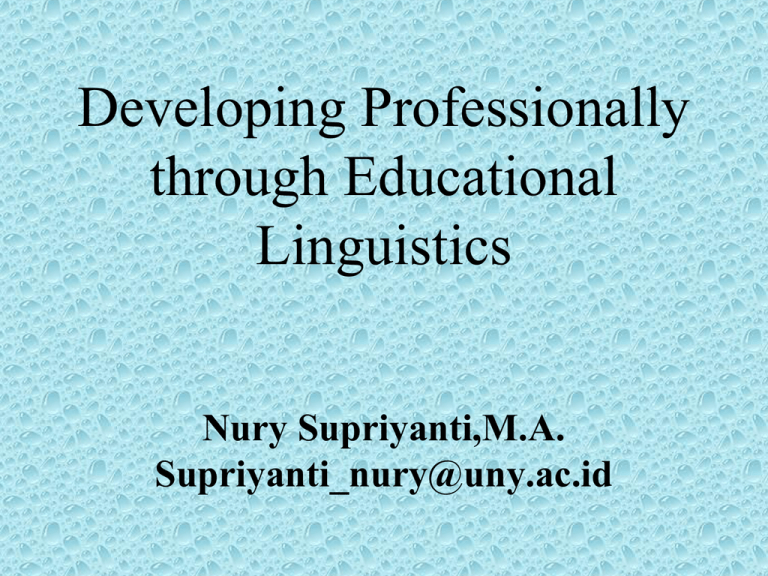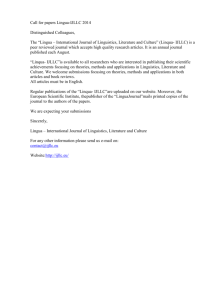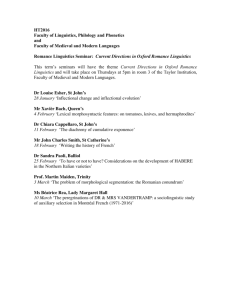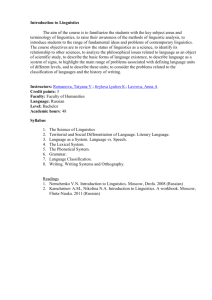Developing Professionally through Educational Linguistics Nury Supriyanti,M.A.
advertisement

Developing Professionally through Educational Linguistics Nury Supriyanti,M.A. Supriyanti_nury@uny.ac.id Those who dare to teach must never cease to learn. (anonymous) Not to examine one's practice is irresponsible; to regard teaching as an experiment and to monitor one's performance is a responsible professional act. (Adrian Hill) All that has to be said is that any occupations aspiring to the title of ‘profession” will claim at least some of these qualities: 4 • a basis of scientific knowledge, •a period of rigorous study which is formally assessed, • a sense of public service, high standard of professional conduct •high standard of professional conduct continued • the ability to perform some specific demanding and socially useful tasks in a demonstrably competent manner. Let us develop ourselves professionally How? With Educational Linguistics What is it? Why? Language teaching takes place in a school and is closely tied to sociological, economic, political, and psychological factors. In educational linguistics, one does not simply apply disciplinary knowledge to a specific situation. Educational linguistics “should not be, as it often seems, the application of the latest linguistic theory to any available problem”, but rather a problem-oriented discipline focused on the needs of practice (Spolsky 1975:347). Instead, the researcher starts with a problem (or theme) related to language and education and then synthesizes the research tools in his/her intellectual repertoire to investigate or explore it (Hornberger and Hult, 2006). The knowledge generated in EL may be used to guide the process of crafting sound educational language policy which is designed to influence practice. English teachers in schools deal with the policy and practice in education. If they only rely on those two aspects, namely practice and policy they will never know whether the educational policy that they have been practicing is on the right track. We need to always make sure that the way we teach and test are justified by theories and research studies related. This knowledge of EL may be used to guide sound teaching practice as it is implemented in relation to educational language policy Sub disciplines of Educational Linguistics •Theoretical Linguistics •Sociolinguistics •Psycholinguistics •Anthropological Linguistics •Neuro linguistics •Clinical Linguistics •Pragmatics •Discourse Analysis •Educational Psychology Basic Principles of EL •EL stresses that literacy should be in primary consideration at each and every stage of educational processes •It is educational linguistics which should be responsible for L1 and L2 acquisition, not applied linguistics. •Verbal intelligence is one of the most-used predictors of educational success. •linguistics is an indispensible part of language learning process •A learner-centered, holistic, humanistic, and problem-oriented language teaching approach should be adopted. •The use of target language in real communication should be the focus of foreign language education. •Language education is a whole together with individuals, educational setting, curriculum design, and educational language policy Classroom interaction is a significant part of language teaching methodology. Language acquisition requires input and interaction A lot still needs to be discussed For teachers To develop most appropriate attitudes toward language teaching and language education Looking at your teaching in a wider scope Looking at your teaching beyond your stuffy classroom Have a great time in being a professional








